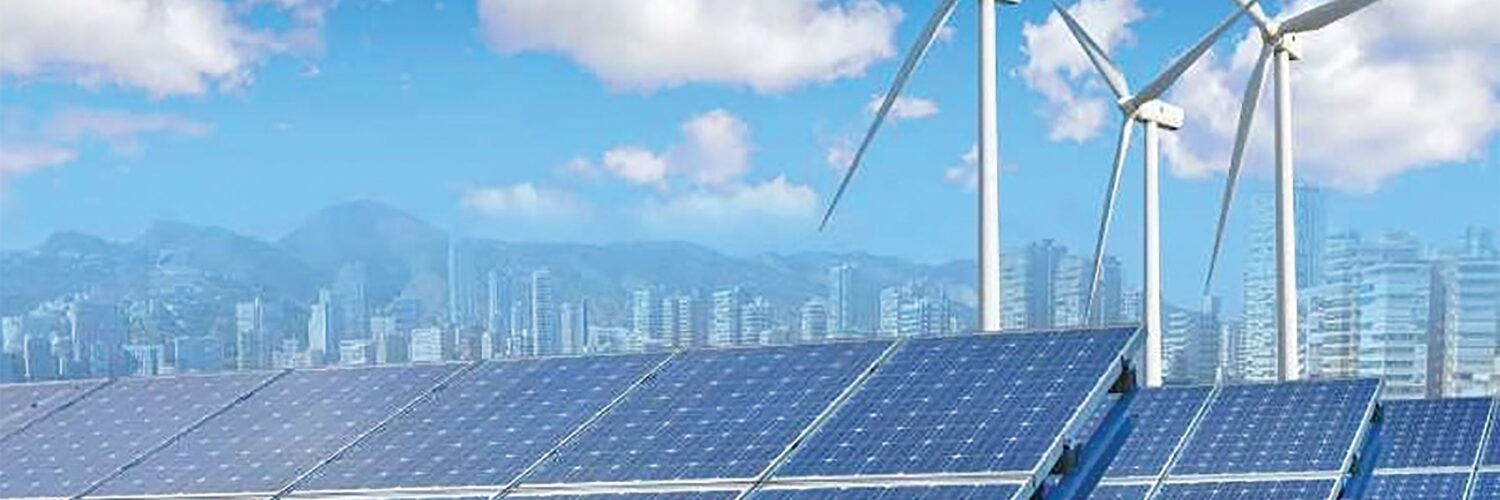RENEWABLE: More investors needed to aid decommissioning of coal-fired power plants…
By Isaac Moledi
South Africa has been setting a positive example for its approach to ensuring a just energy transition. Not only is South Africa embracing renewable energy projects, but it is also wisely pursuing several proactive measures to generate the necessary funding, says NJ Ayuk, executive chairman of African Energy Chamber.
According to Ayuk, one such approach is the Renewable Energy Independent Power Producer Procurement Programme (REIPPPP), which focused on incentivizing private-sector investment in biomass, wind and small hydro.
The government operated the programme between 2011 and 2015 to address energy poverty and extend access to clean electricity. This effort, according to Ayuk, gave South Africa over 6,000 megawatts (MW) of renewable generation capacity.
Due to its success, the programme was re-launched as part of the country’s 2019 integrated resource plan.
“The REIPPPP is fostering a just energy transition complete with job creation and economic transformation. By harnessing significant private sector expertise and channelling investment, the programme is fostering grid-connected renewable energy at competitive prices,” says Ayuk.
He describes the project as huge for the people of South Africa. “We at the African Energy Chamber continue to be impressed with the success of the REIPPPP.”
As an example, Ayuk says the programme has created more than 18,000 jobs in the Eastern Cape and set up 16 wind farms and one solar energy farm.
“Perhaps more importantly, the province also experiences less load shedding (scheduled power outages) as a result of these efforts.”
South Africa also introduced a carbon tax in June 2019. In January 2022, the government increased the tax rate from under R144 per tonne of carbon dioxide equivalent (tCO2e) to R162/tCO2e and announced that the rate will continue to rise to R540/tCO2e by 2030 and R2 160/tCO2e beyond 2050.
More recently, in November 2022, Ayuk says South Africa announced its Just Energy Transition Investment Plan (JET IP).
The five-year plan outlines how South Africa will reduce emissions to 420 million tCO2e by 2030 and identifies the investment needed for the transition to clean energy.
According to the chamber’s new report, “The State of South African Energy,” a just energy transition will require almost R1.8 trillion over the next five years.
South Africa has moved significantly closer to that target, thanks to the R131 billion pledge from the multinational International Partners Group (IPG), R131 billion from the private sector and R184 billion from the public sector.
“This is great — but more needs to be done to
fully bring South Africa’s just energy transition to fruition,” says Ayuk.
While a nice chunk of the necessary funding has already been secured, South Africa needs additional investors (domestic and international) to step up and fund grants, guarantees and concessional loans. I
nvestment will also be required in infrastructure to aid the decommissioning and repurposing of coal-fired power plants, increase the integration of renewables and upgrade existing transmission and distribution networks.
“Importantly, this includes funding new value chains to take the place of phased-out coal to prevent the socio- economic collapse of communities in regions that depend heavily on coal production because we cannot forget, in the shuffle, that eliminating coal means erasing an entire industry’s worth of livelihood.
We need to make certain that those who rely on coal — not only for their energy needs but also for their jobs — are not simply left out in the cold.”
Ayuk says his chamber commends South Africa for its proactive measures to embrace renewables. “Now, it will be important to be diligent about keeping the momentum going.”
His chamber reported in The State of South African Energy, that the Electricity Regulatory Act of 2021 led to 6 GW of renewable generation capacity through private sector projects by bumping up the licensing threshold from 1 MW to 100 MW.
Describing it as forward progress, Ayuk says his organisation has however, noted that an even higher threshold would have fostered greater investment in large utility projects.
For example, the government should consider signing multi-decade land lease agreements with independent power producers to generate even greater renewable capacity to avoid widespread national blackouts and load shedding that have become daily occurrences since 2007.
This is because Eskom Holdings, the embattled government-owned national power utility, cannot keep with the demand.
The power utility generates 90% of the electricity used in South Africa and 30% of the electricity created on the continent.
Ayuk sees the country’s proposed schemes to foster rooftop solar with feed-in tariffs and tax incentives as a mechanism that could play a tremendous role in a just transition, with a two-fold benefit: incentivizing both the residential and commercial sectors and alleviating load shedding.
“And Eskom itself has hinted at accelerating investment in renewables. As yet, unfortunately, we are still waiting to see any of this.”
LAWYERS TURN TO THE COURTS TO CHALLENGE THE INDEFINITE CLOSURE OF THE DEEDS OFFICE
Hold: The closure has legal and financial implications with many transactions being put on hold
By Isaac Moledi
The Pretoria Attorneys Association (PAA) has threatened legal action against the recent closure of the Deeds Office in Pretoria which has left many property buyers and sellers panicking and feeling uncertain about the status of their transactions.
The PAA has threatened court action against the Director General of the Department of Agriculture, Land Reform and Rural Development. The Chief Registrar of Deeds, Advocate Audrey Gwangwa, on 5 April 2023 advised that the Pretoria Deeds Office would be closed indefinitely with effect from 6 April 2023 until further notice. No reasons were disclosed for this action.
The temporary shutdown sent panic and shockwaves within the industry as they were worried how they were going to proceed with their daily transactions.
How does the Deeds Office shutdown affect you and what are the financial and legal implications of the closure on buyers and sellers? Bernard Cowley, a real estate agent at Fitzanne Estate, says it is important to understand the role of the Deeds Office in the property transaction process. “The Deeds Office is responsible for registering property transfers, ensuring that the transfer of ownership is legal and valid. Without the Deeds Office, property transactions cannot be completed and buyers and sellers are left in limbo.”
According to Cowley, many property buyers and sellers who are currently in the process of purchasing or selling a house are understandably concerned about the impact of the recent closure of the office.
“The closure of the Deeds Office means that property transfers cannot be registered, which in turn means that the transfer of ownership cannot take place. This has led to uncertainty and delays in the property industry, with many transactions being put on hold indefinitely.”
Cowley says if you are in the process of selling or buying a house, the closure of the Deeds Office will likely have a significant effect on your transaction. Without the registration of property transfers, the sale and transfer of ownership cannot be completed. Legal and financial Implications for buyers and sellers :
“As a seller, the closure of the Deeds Office may have legal and financial implications for you.
For example, if you have already sold your property and have not yet received the proceeds of the sale, you may be unable to access these funds until the property transfer is registered. Additionally, if you have any outstanding debts on the property, you may be unable to clear these debts until the transfer is registered, which could result in additional fees and interest charges.
On the other hand, as a buyer, the closure may also have legal and financial implications. If you have already paid a deposit on the property, you may be unable to take possession of the property until the transfer is registered.
Additionally, you may be unable to access any funds from your bank or mortgage lender until the transfer is registered, which could also result in additional fees and charges.
According to Cowley, it is important to note that while the duration of the closure of the Deeds Office is indefinite, efforts are being made by Industry stakeholders such as the Pretoria Attorneys Association to address the issue. However, until the Deeds Office reopens and property transfers can be registered once again, the property industry will continue to experience delays and uncertainty.
To soften the blow of the closure, Cowley urges those affected to ensure that all necessary paperwork is completed and submitted as soon as possible. These include transfer documents, bond applications and any other legal documents required for the transaction. “Work closely with your Professional Property Practitioner and legal team to ensure that everything is in order and that all paperwork is submitted as soon as possible.”
To mitigate the effects of the Deeds Office closure, Cowley advises the affected parties to also ensure that all necessary funds are available for the transaction. Buyers should ensure that they have the necessary funds available to cover the purchase price and any associated costs, such as transfer fees and bond registration fees.
Sellers should ensure that they have paid off any outstanding debts on the property and that they have the necessary funds available to cover any outstanding payments.
“Communication is key to ensure a successful transaction during this challenging time. Regularly communicate with all parties involved in the transaction, including the real estate agent, the legal team and the buyer or seller. This can help to ensure that everyone is on the same page and that any issues or concerns are addressed as soon as possible.”
Alternatively, Cowley suggests that buyers and sellers may be able to complete the transaction using a different Deeds Office or by using an alternative registration process. “Consult with your legal team and real estate agent to explore all available options and determine the best course of action.”
Published on the 93rd Edition.






























